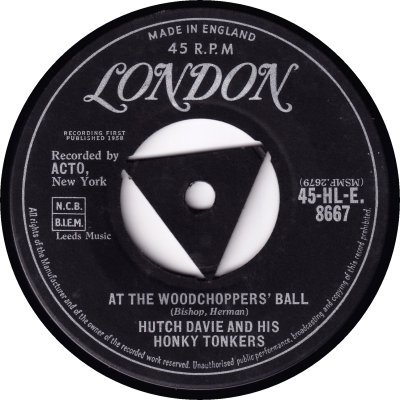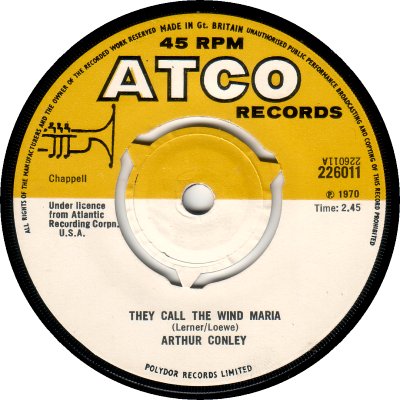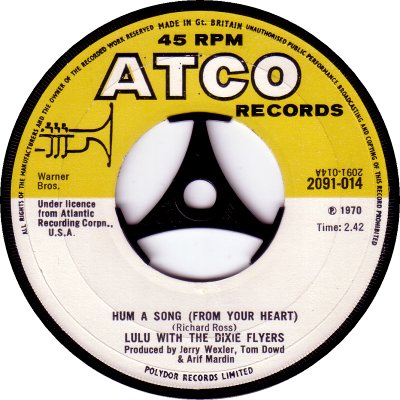


American; a subsidiary of Atlantic. Atco was originally intended to be called 'Atlas', as reported in 'Billboard' of the 23rd of July 1955. According to the article it was to feature Pop and R&B, and an early release would be one by Joe 'Mr. Piano' Henderson, licensed from Polygon Records of the UK. Three weeks later 'BB' of the 13th of August said that a last-minute name change had been necessary, as there already was an Atlas label in existence; the new label, which was to be launched that week, would instead be known as Atco. The Pop / R&B slant was confirmed, but Atco would be handled by different distributors to those which handled Atlantic. Atco enjoyed early success in the R'n'B Charts, and the following year 'BB' of the 23rd of June 1956 told its readers that Atlantic's Herb Abramson had taken over A&R duties and sales direction for the label as part of an attempt to make it as big as its parent.
The recruitment of Bobby Darin ('BB', 24th June 1957) and his placement with Atco gave the label a hefty boost via a string of hit singles; The Coasters provided further impetus by providing several entries to the mainstream Hot 100. 'BB' of the 9th of June 1958 noted that that group's 'Yakety Yak' had sold four hundred thousand copies over the course of several weeks and that Darin's 'Splish Splash' was 'taking off'. Towards the end of that year there came a change of management, as Abramson sold his remaining interest in Atlantic and left to start his own label, Triumph ('BB', 15th December). From that point Atco appears to have been overseen by Atlantic's management team of Ahmet and Nesuhi Ertegun, Jerry Wexler and Miriam Bienstock. The change doesn't seem to have had any adverse effects on the label's fortunes, and by the summer of 1959 it was really making an impact: 'BB' of the 8th of July observed that it had five singles in the current Hot 100 and that another had just slipped out. Perhaps as a result, the decision was taken to develop Atco as an album label rather than a mainly singles one ('BB', 10th August 1959).
Atco continued offering a mixture of R'n'B and Pop into the '60s. The Pop tended to be of a MOR kind, often licensed from abroad: Nina & Frederik appeared on the label, as did Bent Fabric & His Piano, and - more successfully - Acker Bilk. 'BB' of the 29th of December 1962 was able to say that Bilk's 'Stranger On The Shore', a big hit in Britain on Columbia, was approaching the one million sales mark. The second half of the decade found the Pop turning to Rock, with the likes of Vanilla Fudge and Buffalo Springfield featuring on Atco. A long-term licensing deal between Atlantic and UK Polydor ('BB', 26th March 1966) led to product heading in both directions; as a result records by The Bee Gees, Cream and Derek & The Dominos began to surface on Atco in the States, alongside less obvious items such as 'Leap Up And Down (Wave Your Knickers In The Air)' by St. Cecilia. Other licensing deals saw records such as The Troggs' 'Wild Thing' and 'Keep On Running' by The Spencer Davis Group seeing the light of day on Atco. The pattern continued into the 1970s and beyond, with other names familiar to British buyers coming out on the label alongside home-grown American product: they included Juicy Lucy, Roxy Music, Genesis, Boney M, and Gary Numan. As a subsidiary of Atlantic, Atco followed its parent Atlantic everywhere, becoming in turn part of Warner-Seven Arts, Kinney, WEA and lastly Time Warner; for details see the Atlantic page. It survived until 1991, and was revived in 2006.
Atco was far less well-known in Britain than it was in the States. Its products were initially licensed to Decca in the UK, together with those of Atlantic, and they appeared on the London label alongside those of its parent company, with a production credit (1) - on the example shown the company's name is misspelled as 'Acto'. When Decca gave Atlantic its own identity, in July 1964, Atco material was issued on the Atlantic label rather than on its own. It made its first appearance under its own name in Britain in April 1969, at which point Atlantic was licensed to Polydor (q.v.), and disappeared in early 1971; during that time it issued around a couple of dozen singles. Numbering was initially in the 226-000s, but from early 1970 Atco and Atlantic singles shared a common 2091-000 series. Manufacture and distribution were by Polydor, which resulted in three-pronged dinking perforations (2) or large spindle holes with three-armed 'spiders' (3). A couple of the singles got into the Top Fifty - Otis Redding's 'Love Man' b/w 'That's How Strong My Love Is' (226-001; 6/69) reached No.43, while Lulu's 'Oh Me, Oh My' (226-008; 11/69) stalled at No.47 - but there were no big hits; several earlier singles which had been on Atco in the States were hits here on Atlantic, ones by Bobby Darin and Sonny & Cher being cases in point. 'In-A-Gadda-Da-Vida' by Iron Butterfly (2091-024; 7/70) appears to have been cancelled but there are a few copies in existence - if you see one, grab it. The Atco label surfaced again in 1980 as part of the WEA group, with a new design; catalogue numbers, this time in the K-10000s, were again shared with Atlantic.



Copyright 2007 Robert Lyons.

